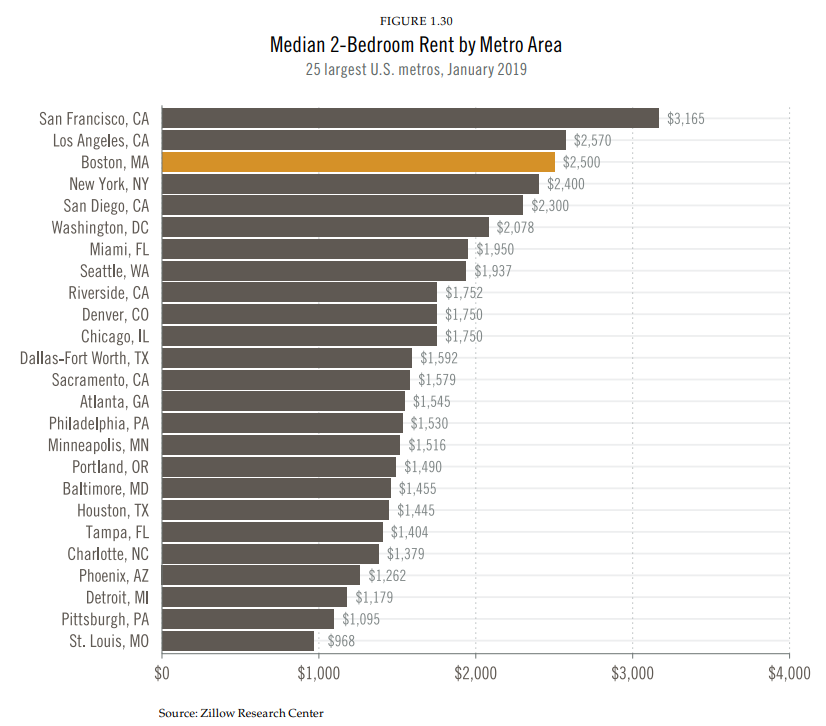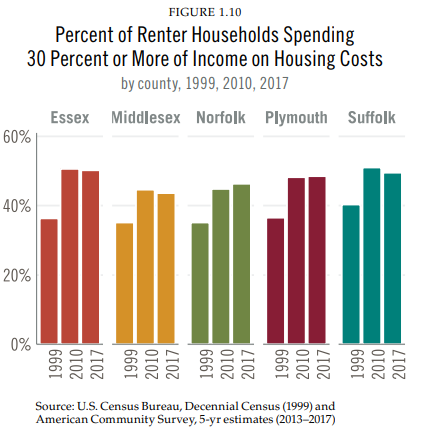The rent’s too damn high. So true that Rent Is Too Damn High is a political party in New York City. So true that several Democratic presidential candidates have developed federal policy proposals that would reform zoning – an extremely rare federal intrusion into what has historically been seen as a local issue. So true that for the first time in decades rent control legislation is not only being proposed, but actually winning (Oregon, California). But what do we mean when we say “housing affordability?”

Affordability One of Many Housing Problems in Holyoke
I was in my hometown of Holyoke attending a meeting for a community-based organization, Neighbor 2 Neighbor, and we were discussing priorities for the group. We discussed law enforcement, environmental justice and climate change, the quality of schools – none of them raised as much raw emotion as the topic of housing affordability.
The residents of this deeply impoverished part of the Pioneer Valley rattled off a litany of problems under the umbrella of “Housing Affordability”:
- Bad Quality: The quality of housing is terrible. Slum lords charge too much money for apartments with faucets that don’t work, windows that won’t close, and walls that are full of mold;
- Bad Policy: Federal housing subsidies have way too many strings attached, a big one being a prohibition of people with felony convictions on their records living in public housing. Poor people with felony convictions end up living “informally” with family members, friends, or significant others – making it that much more difficult to complain about bad housing conditions, for fear that they will be found out and evicted;
- Bad Safety: Drug dealers and sex workers hang out in the hallways of these apartment buildings, do business out of first-floor windows, and scare other tenants from leaving their apartments. Perversely, even though there is fear about being evicted for having a person with a felony conviction living in your apartment, the building owners won’t act to evict these problem tenants.

Untangling Two Housing Market Failures
Housing affordability is something near and dear to my heart. As I discussed in a prior blog post, the cost of housing was a main reason I left the Boston area. But as the conversation with these Holyoke residents continued, I realized that the problems being discussed were categorically different from the housing issues I complained about while I lived near Boston.
Across all income groups, housing costs in eastern Massachusetts are a burden and only becoming more so. As The Boston Foundation’s Greater Boston Housing Report Card 2019 put it, “Higher income levels in the Boston metropolitan area are still not nearly enough to offset the region’s extremely high housing prices.”

It occurred to me that the problem these community members in Holyoke were articulating as “Housing Affordability” was fundamentally different from the issues faced in greater Boston. One of the things that drew me to Holyoke was the low cost of housing. Furthermore, Holyoke and Springfield constitute the two main clusters of affordable housing in the region. Why was housing affordability such a hot topic?
Fortunately, a smarter person than I has already explained this issue. The housing policy expert Jenny Schuetz said the following in an episode of The Weeds podcast:
There are only two partially overlapping housing affordability crises in America, one that affects low-income households in all parts of the country and another that affects a larger share of households in a minority of markets (mostly in coastal metro areas) that suffer from an acute shortage of housing.
Understanding and disentangling these issues is crucial to solving them. The basic problem in greater Boston is that they can’t produce enough housing to meet demand. The basic problem in Holyoke and Springfield is that people are extremely poor, and so housing at any cost is unaffordable.
Different Problems, Different Solutions
The issue faced by greater Boston is underproduction of housing, typically due to land use and zoning policies. Requirements such as minimum lot sizes, minimum parking requirements, separation of single-family and multi-family housing, and prohibition on Auxiliary Dwelling Units all contribute to housing supply unable to keep up with demand.
To that end, the Baker Administration has been pushing for years to revise the state’s outdated enabling legislation for municipal zoning. Some of the things they want to do are:
- Create an incentive program of additional funding for communities which build more housing;
- Require a City Council or Town Meeting to only have a simple majority instead of a super-majority (2/3 majority) to change zoning code;
- Achieve a goal of 135,000 new housing units statewide by 2025.
This legislative push will only minimally impact Gateway Cities like Holyoke and Springfield. There is plenty of housing in Hampden County, although much of it is derelict – apartment buildings and mill buildings which could be converted to condos sit vacant.

The problem that Holyoke and Springfield face is extreme poverty. The downtown areas in both cities are comprised of neighborhoods where over half of the families are in poverty – annual incomes of less than $26,000 for a family of four. With money that tight, no housing market will ever provide housing that is affordable to these families. And it’s not just housing; food, clothing, toiletries, transportation, medication – all of it is a struggle to afford.
The problem is not housing per se, it is poverty.
Unfortunately, it took decades to sap the wealth out of Springfield and Holyoke, and who knows how long it will take to mend that. Hampden County residents are victims of an international trend pulling resources out of the country’s industrial regions. The zoning and land use legislation proposed by Governor Baker might help families in eastern Massachusetts, but the solution to our problems is much, much more complicated.
It will take nothing less than overcoming systemic racism, reversing the disinvestment in public services and institutions, and eliminating preferential treatment given to large corporations while regional economies collapse. Simple, right?

Very interesting. In general, MAis thought of as a wealthy state. This explanation of the housing crisis in impoverished areas of the state was enlightening. Very thought provoking to see the similarities in housing shortages in the wealthy areas of the state and the poorer ones.
LikeLike